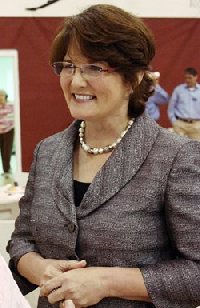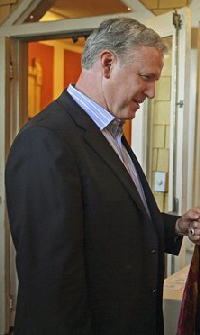Frank Della Valle isn't under any illusions.
The soft-spoken 62-year-old from the Bronx knows that running for Congress on both the Conservative and Republican party lines is no easy task in one of the country's most Democratic districts. He knows that his opponent, Rep. José Serrano, has never received less than 92 percent of the vote in more than two decades in office, and that his prospects are further dimmed by the fact that he's no politician — he's a piano tuner.
"To be quite honest," Della Valle says, "it's a long shot."
Della Valle isn't just an underdog but a sacrificial lamb in a quixotic bid against a House incumbent. With a skeletal campaign operation, little money and no support from national bigwigs, such candidates ensure their party at least has a name on the ballot.
Others in this group this year are a Republican rancher in New Mexico and a Democratic hot dog vendor in Texas. They'll challenge the more than 80 percent of House incumbents who are considered shoo-ins for re-election by both the Democratic Congressional Campaign Committee and the National Republican Congressional Committee.
Why bother?
Many are simply tired of the widely accepted notion that incumbents never lose.
 |
| Shmuley Boteach (AP Photo) |
Rabbi Shmuley Boteach, the GOP challenger to Democratic Rep. Bill Pascrell in New Jersey's 9th Congressional District, calls it "the obscenity of incumbency."
"If they can't lose, what do they care about your interests?" said Boteach, a TV personality who wrote the book "Kosher Sex" and served as pop star Michael Jackson's spiritual adviser.
In every cycle since 1964, at least 85 percent of incumbents have won re-election, according to the Center for Responsive Politics.
"These guys need to be held accountable. And what better way than to mount a very serious challenge and fight like hell?" Boteach said.
The rabbi doesn't see himself as a David to Pascrell's Goliath. In fact, Boteach says his victory is a "mathematical certainty," even though his opponent has raised significantly more money and registered Democrats outnumber Republicans by more than 2-to-1 in the district.
It could be worse.
Alabama Democrat Penny Bailey, a retired Air Force colonel, is running in one of the most Republican-leaning districts in the nation. Although she's the first Democrat to challenge GOP Rep. Spencer Bachus since 1998, Bailey shares Boteach's sense of confidence.
 |
| Penny Bailey (AP Photo) |
"I'm a female who just retired from the military after 24 years. This is not the first difficult situation I've found myself in," she said, even going so far as to predict a surprise victory over Bachus in November.
Improbable as it may seem, an upset isn't impossible. There could be an unforeseen development.
In 2008, for example, Republican lawyer Joseph Cao shocked Louisiana's political establishment when he defeated longtime Democratic. Rep. William Jefferson, who had been indicted for corruption. Low voter turnout and Jefferson's legal woes contributed to the unexpected outcome.
"You never know when lightning may strike," said Bruce Oppenheimer, a professor of political science at Vanderbilt University. "If you don't have somebody on the ballot, you're not going to win, plain and simple."
In San Francisco, Republican businessman John Dennis understands that you have to run to win. For the second consecutive election, the 48-year-old Republican is challenging Nancy Pelosi, the House Democratic leader and former House speaker.
 |
| John Dennis (AP Photo) |
Unlike most other sacrificial lamb candidates, Dennis was an effective fundraiser during his last campaign, nearly matching Pelosi's $2.5 million campaign haul. But the cash helped him win just 15 percent of the vote, as the liberal district overwhelmingly supported Pelosi in a year that saw her lose the speaker's gavel.
"You have to have the right expectations about what you're trying to accomplish," said Dennis.
Win or lose, these candidates generally agree that their campaigns serve a critical role in American democracy.
Della Valle understands that while he'll probably return to tuning pianos after the Nov. 6 election, he provides the voters with an option.
"At the end of the day, the voters will pull the lever however they want to pull it. We're not there to browbeat them," Della Valle said. "We just want to offer an alternative. It's important for people to know there's a choice."
© Copyright 2026 The Associated Press. All rights reserved. This material may not be published, broadcast, rewritten or redistributed.